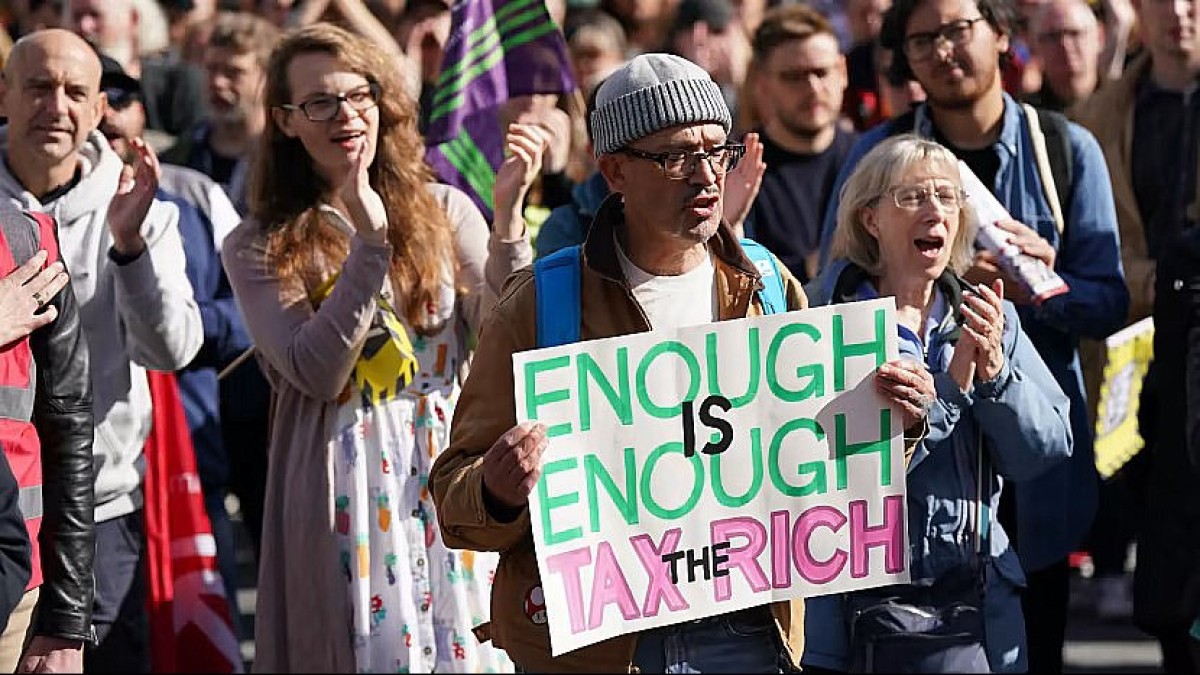 105
105
Britain, which has lost many opportunities following Brexit, has been dragged into the COVID-19 crisis while already embroiled in an unprecedented economic downturn.
The Ukraine conflict, Europe’s fragile economic state, and energy shortages aggravated the situation for British citizens. Britain is stuck in a spiral of financial disasters. The country’s authorities acknowledge that a pivotal moment in its modern history has arrived when it becomes evident that the socioeconomic turmoil is no longer a premonition. Politically, the country’s police are granted greater authority to quell demonstrations brutally.
Massive rallies have been organised in recent weeks against economic collapse. As a dark legacy from Queen Elizabeth II to his late-crowned son, Charles III, further demonstrations are expected to be staged in the following weeks. Recent economic calamities in the UK have revealed the highly precarious situation of the country, as Britain has witnessed the shortest prime ministerial tenure in its 300-year history.
Four politicians from the British Conservative Party—David Cameron, Theresa May, Boris Johnson, and finally, Liz Truss—have served as prime minister during the previous several years. However, each of their administrations was shorter than the previous one, resulting in three changes of prime minister within a single year. Truss arrived at 10 Downing Street with the slogan “growth, growth, growth,” seeking to emulate Thatcher’s grandiose financial policies; however, the exact reverse happened, and she resigned in utter disgrace.
The £50 billion Truss’ economic package disproportionately favored the affluent class. It led to a further decrease in the pound’s value, a catastrophic crisis in the local markets, and a deterioration in Britain’s financial reputation and international credibility. The nation is experiencing the highest inflation rate in forty years, and the cost of electricity, food, and other products has risen every day since Rishi Sunak assumed leadership. In his first formal address as prime minister, Sunak claimed he intended to “immediately” correct the errors of the past administrations.
Earlier, in this respect, the Bank of England (BoE) had warned that inflation would hit record highs and the United Kingdom would face a severe long-term recession as early as this autumn due to economic troubles and multifaceted internal and global instabilities. Sunak is now grappling with an uncontrollable economic crisis, unending social difficulties, a wobbly party, a lack of full support within the Conservatives, and a severely divided society as calls for another referendum in Scotland, become more vociferous.
According to Prof. Sergey Shein, Director of the Centre for Comprehensive European and International Studies in Moscow, Rishi Sunak must cope with the energy crisis and domestic and global geopolitical upheavals. Prof. Shein argues that Sunak should be expected to adopt a more balanced approach to avoid losing credence so that he can restore the lost credibility of his fellow Tory colleagues.
Now, following several weeks of political shifts in the British government, there are whispers about the inefficiency of Sunak and his economic team, prompting questions like, “Was Rishi Sunak the best choice for the position?” Or will he, like many of his predecessors, give up after a brief foray? Many older members of the Conservative Party did not back Sunak and believed he was not qualified to steer the country out of its current financial imbroglio.
Sunak is being condemned for treachery and backstabbing by seasoned Tory members. They claim that Sunak’s departure as British Chancellor of the Exchequer in response to Johnson’s controversies triggered a chain reaction of resignations in the cabinet, leaving Johnson with little choice but to leave. Truss became the fourth British Prime Minister in the preceding six years due to the same internal schisms in the Conservative Party. Truss, too, utterly failed to deal with the cataclysmic repercussion of the UK’s faltering economy.
All four previous British prime ministers resigned due to political and economic tension and instability. Now we must wait for the more challenging days ahead for the British people and the grim prospect for Europe. The economic team of the ruling British Sunak is to prognosticate the downfall of his financial programmes and the subsequent drastic changes before the 2024 general elections. This will be a striking example of the never-ending financial cycle that plagues Britain
Comment
Post a comment for this article